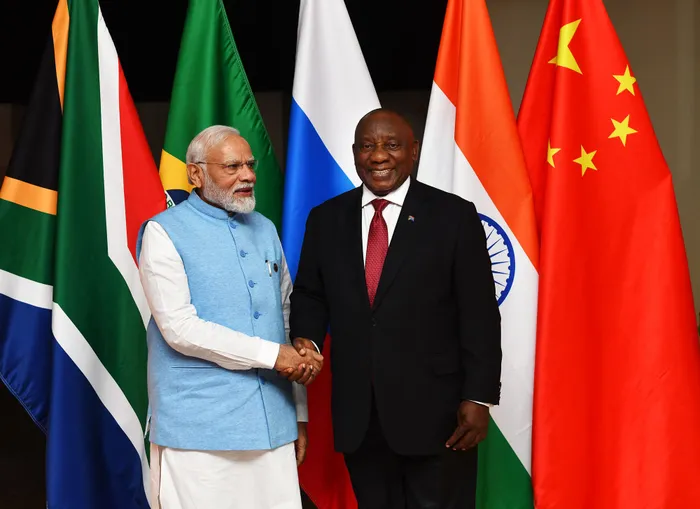
Indian Prime Minister Narendra Modi and South African President Cyril Ramaphosa.
Image: Jairus Mmutle / GCIS / File
AS global power balances continue to shift, few partnerships remain as steady, values-driven and strategically aligned as that between India and South Africa.
This week’s G20 Summit reminds the world that on issues that matter to South Africa — multilateral reform, Global South equity, development finance, technology access, and Africa’s rightful place in global governance — India has consistently stood with Africa’s most industrialised and diversified economy.
At the centre of this engagement is Indian Prime Minister Narendra Modi, whose tenure has injected unprecedented energy into India’s outreach to Africa.
At this year’s G20, Modi is not only among the most experienced statesmen in the room, he is, in many ways, its most consequential leader. With the US, Chinese and Russian presidents absent, his presence provides a stabilising anchor during a moment of geopolitical uncertainty.
His leadership as G20 chairperson in 2023 reshaped global expectations. It was under India’s presidency that the African Union (AU) was admitted as a permanent member of the G20. This was a transformative moment for Africa, signalling the continent’s arrival as an equal stakeholder in global decision-making. Few leaders have “walked the talk” on Africa the way Modi has.
This year, India remains a strong voice of support behind the scenes, especially in negotiations over the often-contested outcome document. India’s message has remained consistent: growth, stability and justice for the Global South must define the new multilateral order.
India played a key role in securing South Africa’s inclusion in IBSA, enabling Pretoria to help shape one of the most enduring South–South cooperation platforms. As South Africa hosts this year’s IBSA Trilateral, it does so with India’s full encouragement, an affirmation of South Africa’s leadership in the Global South.
South Africa’s induction into BRICS also came with strong Indian support. As BRICS has grown in influence, India and South Africa have deepened their partnership based on shared democratic values, economic complementarities and a common vision for a more equitable world system.
During last year’s BRICS Summit, when uncertainty clouded participation, Modi was the first major leader to confirm his attendance. His early confirmation set the tone, encouraging others to follow and ensuring the summit’s success.
India–South Africa ties rest on historic solidarity, from Gandhi’s early years in Durban to India’s strong support for the anti-apartheid movement. Today, this legacy continues through:
- A vibrant South African Indian diaspora
- Strong trade and investment links
- Warm rapport between PM Modi and President Cyril Ramaphosa
- Growing political dialogue, with ANC and DA leaders engaging the BJP as India advances its development trajectory
This is a relationship with uncommon depth and enormous room for future growth.
South Africa remains the second-largest economy in Africa and is India’s fourth-largest trade partner on the continent, supporting substantial bilateral trade valued at more than $18 billion (R310bn). South African exports to India include vital commodities such as gold, coal, copper, and phosphoric acid, while India exports petroleum products, vehicles, pharmaceuticals, and machinery to South Africa.
These trade ties have created thousands of jobs and facilitated Indian investment in mining, technology, and infrastructure sectors within South Africa.
Yet the partnership also faces challenges. South Africa’s hosting of the G20 has been marked by geopolitical tensions, including the high-profile boycott of the summit by US President Donald Trump, who accused South Africa of human rights abuses against White Afrikaners, alleging a “white genocide” amid contentious land reform policies. This boycott has added strain to South Africa’s international relations and brought global scrutiny to its domestic and foreign policy choices.
However, as global shifts accelerate, India and South Africa share a responsibility to shape a cooperative future. Key areas include deeper technology and innovation partnerships, regular government-to-government (G2G) interactions including summits, enhanced cultural and sporting exchanges, and youth- and women-centred collaborations. Joint work in manufacturing and supply-chain diversification also holds significant promise.
South Africa’s strategic geographic position and well-established logistics networks provide India with crucial access to the African continent’s markets. Moreover, South Africa’s leadership in the African Continental Free Trade Area (AfCFTA) facilitates opportunities for Indian businesses seeking regional integration and expansion in Africa.
On the climate and environmental front, India’s leadership at the G20 has attracted critique for its continued reliance on coal and reluctance to commit to a clear fossil fuel phase-out, prompting warnings from experts about the risk of greenwashing and insufficient global climate ambition.
Modi’s commitment to South Africa and the African continent is unmistakable and deeply strategic. For South Africa, he represents not just a partner but an opportunity to renew and future-proof a relationship built on solidarity and shared aspirations.
At the G20 and beyond, India and South Africa stand together because they believe in a world that must stand together. Few partnerships better capture the future that the Global South seeks to build.
* Sizwe Dlamini is editor of the Sunday Independent. The views expressed do not reflect those of IOL or Independent Media.